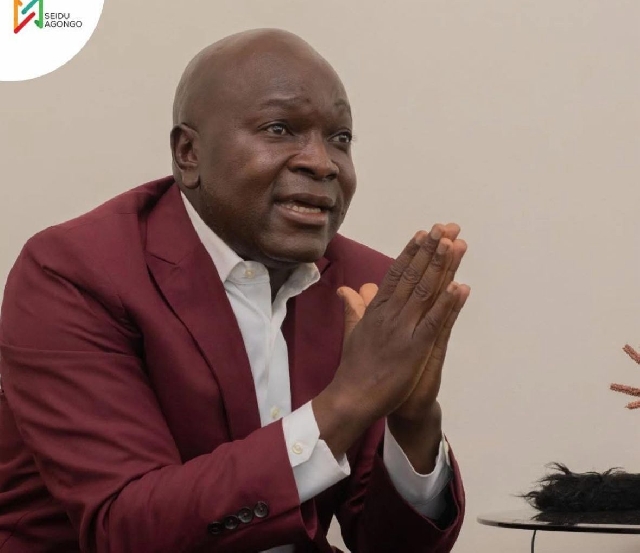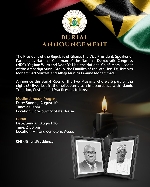National loss, personal pain: The families we must not forget
 Seidu Agongo
Seidu Agongo
Ghana is reeling from the tragic helicopter crash that claimed the lives of two ministers and six others on last Wednesday.
As flags fly at half-mast and tributes pour in, a deeper question lingers: what becomes of the families, especially the children left behind when the mourning fades?
Beyond the shock and sorrow lies a call for sustainable support—for the children, spouses, and dependents now facing life without their loved ones.
This is not the first time national tragedy has left families in limbo. Earlier in March 2024, Deputy Finance Minister John Kumah passed away, leaving behind his wife and six children.
Now, the families of Dr Edward Omane Boamah, Dr Ibrahim Murtala Muhammed, and six other victims—Dr Muniru Mohammed Limuna, Dr Samuel Sarpong, Samuel Aboagye, Squadron Leader Peter Bafemi Anala, Flying Officer Twum Ampadu, and Sergeant Ernest Addo Mensah—face similar uncertainty.
These are not just names on a list: They were fathers, husbands, breadwinners, and mentors. Their sudden absence has created lifelong emotional and financial voids that cannot be filled by condolences alone.
As a nation, we must move beyond ceremonial mourning.
We must institutionalise support systems that ensure the children of public servants who die in active service are not left behind. This includes education scholarships, housing assistance, mental health support, and financial aid—not just for a few months, but for the long haul.
Pattern of forgotten families
History has taught us painful lessons about how quickly society's attention shifts away from the families of those who served our nation.
Take the family of our late President, Professor John Evans Atta Mills, who died in office in July 2012, leaving behind his wife Ernestina Naadu Mills and son Sam Kofi Atta Mills.
More than a decade after his death, one wonders if the family gets the support and attention that Prof. Mills, if alive now would have attracted to them.
The case of Dr Kumah, the Deputy Finance Minister who died at age 45, his widow recently opened up about the deep disappointments her family has experienced, stating: "What is painful is the disappointment, the betrayals, the rejections. People we thought would be there — the way they turned their backs on us. The lies, the deceptions".
Perhaps, no case illustrates this abandonment more tragically than that of Captain Maxwell Adam Mahama, who was lynched by a mob in Denkyira-Obuasi in May 2017, leaving behind a wife and two children.
While Major Mahama was given a state burial and the government established the Major Mahama Trust Fund, which was put before Parliament, the broader question remains: Are these isolated gestures enough?
Cruel reality of fair-weather support
The harsh truth is that many people who were once close to these deceased leaders – those who benefited from their positions, influence, or generosity – often disappear when their source of benefit is no more.
As Mrs. Kumah painfully discovered, "People we thought would be there" turned their backs when they needed support most, though she acknowledged that "God has been faithful, helping them navigate the difficult moments".
This pattern repeats itself across our society. When a prominent figure dies, the initial outpouring of sympathy is genuine and heartfelt.
State funerals are organized, tributes are paid, and promises of support are made. But as weeks turn to months and months to years, the families often find themselves struggling alone, forgotten by those who once sought favor from their departed loved ones.
Sustainable support systems
As we mourn the loss of eight lives crashed to death in this tragedy, we must commit to doing better.
We cannot allow their families to suffer alone and in silence after the united, loud and outpouring of grief. They must not suffer the same abandonment that has befallen others.
While I finalize my own widow mites plans, I call upon our government, civil society organizations, the private sector, and individual citizens to establish sustainable support mechanisms that extend far beyond the mourning period.
These could include:
Educational support: Scholarships and educational trusts for the children of the deceased, ensuring their academic futures remain secure.
Economic empowerment: Skills training and business support for surviving spouses to help them become self-reliant.
Psychological support: Counseling and mental health services for families dealing with grief and trauma. It is heartwarming to note that the government has already put in place this initiative and even extended it to the public also affected by the tragedy.
Long-term financial security: Pension schemes and insurance policies that provide ongoing support.
National framework
We need a comprehensive national framework that addresses the welfare of families of all public servants who die in service - not just high-profile cases.
The murder of Major Mahama "reignited calls for an end to instant mob justice," but it should also have sparked a broader conversation about supporting families of fallen service members.
Every police officer, soldier, teacher, healthcare worker, or civil servant who dies in service leaves behind people who depended on them.
Their sacrifice to the nation should be honored not just with words, but with concrete, lasting support for those they leave behind.
Collective responsibility
The test of our humanity is not in how we treat people when we need them, but how we care for their families when they can no longer benefit us.
The families of Dr Omane Boamah and Dr Murtala, along with the other victims of this tragic crash, are watching to see if we will be different. And we should, for life is as unpredictable as we saw when that calamity unfolded barely a week ago. Hail, hearty today and tomorrow you’re gone.
Let us not allow these families to join the ranks of the forgotten. Let us not force them to experience the "disappointments, betrayals, and rejections" that others have endured. Let us create sustainable pathways of support that honor the memory of the departed while securing the future of those they loved most.
The time for action is now, while our grief is fresh and our commitment is strong. Tomorrow may be too late, and another family may find themselves abandoned in their hour of greatest need.
Our departed leaders served Ghana faithfully. Now it is our turn to serve their families with the same dedication and commitment.
This is not charity – it is our moral obligation and the true measure of our collective character as a nation.
The author, Alhaji Seidu Agongo is a businessman and philanthropist committed to social justice and community development
Source: Classfmonline.com
Trending News

Ga Mantse lays flowers in honour of helicopter crash victims
01:22
Central Regional NDC mourns fallen national heroes in helicopter crash
12:37
Dr Krugu slams COCOBOD CEO, gov’t over 'insulting' cocoa price increment
13:21
WHO donates medical supplies to boost Ghana’s Mpox response
08:54
Burial rites for two muslim victims of helicopter crash today
01:13
Therebel Weah wins ultimate student of the year at 2025 Ghana Basic School Awards
12:19
Bawku: ‘Stop the lies or show the evidence’ – Angry Fulani leaders slam security analyst over wild gun-smuggling allegations
12:54
Bernard Bediako Baidoo elected NDC PC for Akwatia by-election
19:05
Bawumia consoles Mahama over loss of ministers in helicopter crash
03:03
Seven Great Princes Academy crowned basic school of the year at Ghana Basic School Awards
12:13



